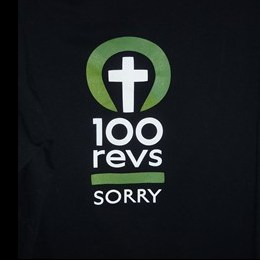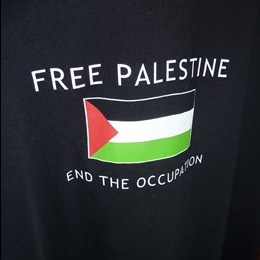Pilgrims: a selection of personal stories from members of St Philip's
A deacon in a place of prophecy
by the Revd Linda Anchell, 2010.
It is good to have both Archdeacon Anne and Deacon Robin to tell you what deacons are; I don't think I know, and I've been a deacon for nearly 19 years.
This year I have been brought up short a couple of times and reminded of what I am. Recently it was words from Patricia Brennan at the AGM of the Movement for the Ordination of Women. At the AGM last year, thinking especially of the deacons in Sydney Diocese, she said: "If you occupy a place of prophecy and do not prophesy then you stifle passion." I think deacons occupy a place of prophecy. I will tease that out later, but let me look first at a couple of my own T Shirts.
 The 100Revs T shirt: I wear this with pride as I am one of the hundred "revs" who signed an apology to the Queer community in 2008; the apology says:
The 100Revs T shirt: I wear this with pride as I am one of the hundred "revs" who signed an apology to the Queer community in 2008; the apology says:
"Christian ministers apologise for their lack of welcome to the Gay community"We are ministers who:
- have heard that many people in the GLBTQ community still feel rejected, shunned and even hated by the Church.
- who see the fear of many in the churches; and
- who know that the christian message is not often out there in the queer community.
Fred and I were in Sydney, on our way to Noumea, that year and saw the group who were marching in the Gay and Lesbian Mardi Gras. Last year I was going to hire a wheelchair and be with them in the parade. But they did not march. Fred and I went up anyway. And I needed the wheelchair, but didn't have it!
This year they did march, but I wasn't there. Sigh.
The two Baptist ministers who started the movement found that it cost them dearly, professionally. Colin and Mike had heard the stories of rejection from their congregations in inner city Sydney. I heard those stories when I joined the Gay and Lesbian Qwire here in Canberra. I was also the "Queer Chaplain" at ANU for a while with the impossible task of trying to let people know that there are churches like St Philip's where they will be welcomed and valued.
This T shirt isn't about me and that story though, it is about the church. The way we too often exclude people (usually without being aware of it), the huge difficulty the church seems to have in talking about sexuality, the consequences that has, for example, for the world-wide Anglican Communion.
There are certain national Anglican churches challenged by Islamic fundamentalists who are proclaiming a fundamentalist gospel in response. They find their felloship with the Episcopal church in the USA and the Canadian Anglicans very difficult, and don't want to be challenged by very different readings of the gospel. The Sydney diocese is in that group too.
 This other T Shirt is one I wear often to the Women in Black vigils. These are weekly vigils in Civic, and also four times a year when a new session of Parliament convenes we stand at the back entrance of Parliament House as the politicians and workers arrive in the early morning.
This other T Shirt is one I wear often to the Women in Black vigils. These are weekly vigils in Civic, and also four times a year when a new session of Parliament convenes we stand at the back entrance of Parliament House as the politicians and workers arrive in the early morning.
Women in Black began in Jerusalem 22 years ago with Jewish and later some Palestinian women. It is now a world wide movement.
We stand in silence, for justice and peace, opposed to war and other forms of violence. We stand in silence.
I have been asked why we stand by Mohammed, my local pharmacist, and Peter, a worker in the MS Society. I mumbled some answer, and then they told me about their sons, precious children (too precious to go and kill other precious children) — about Peter's family history of war and concentration camps. War is not the answer! There are other ways to fight oppression and violence.
Being silent gives those who pass us an opportunity to think about their own issues and histories.
In Jerusalem, Women in Black are standing against the Israeli occupation of Palestine. These Israelis who stand against their own government are increasingly being vilified and marginalised. I hope that having women standing, weekly and silently throughout the world because of what they did 22 years ago may be a source of some strength to them.
For me, these two T Shirts indicate something of my diaconal ministry.
Returning to Patricia Brennan: "If you occupy a place of prophecy but do not prophesy, you are stifling passion."
What was Stephen up to just before he was stoned? His sermon reminds people of who and what and whose they are. "You are the ones who received the law, and yet you have not kept it."
In Chronicles, Zechariah also reminds the people of whose they are.
"Because you have forsaken the Lord, you shall be forsaken."
And they both pay the price.
There is a prophetic role for deacons in the church. To be people outside the structure, yet still speaking to it. There is a prophetic role for deacons and there is a prophetic role for the church very member of it.) To speak to our society from outside of the structures of power, but speaking to power.
We need to see differently, remembering that, "the eye sees only what the mind is prepared to comprehend." We need new language, new stories, new words. So that we can think differently, see differently.
What is it that we see differently? How are we different? How can we speak this?
We have a rich resource here in the Bible. For me, the Old Testament is summed up in three words: justice, righteousness and peace. But in Australia today I might just as well be saying: Mishpat, Tzedekah & Shalom. (That last word Shalom might be understood, maybe.)
- Justice. (Mishpat) sometimes thought of being simply about Courts of Law; criminals and policing; I heard a Woman in Black quite baffled about our call for justice a few years ago.
- Righteousness (Tzedekah) gets caught up with "self-righteousness" and ignored totally. But to be a "righteous person" is a task for every person.
- Peace (Shalom): is it just the absence of war? Shalom is a very deep and special word. Perhaps the Israeli government needs to be reminded!
We need to tell new words and new stories. If we fail to prophesy to our society, then we risk losing the passion that gives us the vision of the glory of God and the words to proclaim it. Lord, give us new eyes to see, and the words we must speak and the courage to be different and to be your people here.
Some references and other links:
"If you occupy the place of prophesy(sic), but do not prophesy you are stifling passion." — Dr Patricia Brennan addresses Sydney MO Watch AGM. Download the talk. (pdf)
"Stephen Patterson says, 'They summoned the institutional church to come forth from its sepulchre and to discover the form of resurrection in relation to life and death. And what happens when it doesn't come forth. Some of those who stay in the hope of changing it from within may run the risk of tasting the death of passion … If you occupy the place of prophesy(sic), but do not prophesy you are stifling passion.’ " — MO Watchin, May 2010 newsletter.
From LGBT Anglicans Inclusive Church newsletter 26 May 2010: "Our problems with the state of the Church of England will not disappear within six hours of getting a letter published in The Times. Building a better church free of theologies of sexism, racism is thousands of times more complicated a process than flying someone home from India, but we have thousands of times more supporters, and if we make some noise, in Deanery and Diocesan and General Synod, in the Church and secular press, we can make a difference. Do not wait for someone else to speak out — it is your calling. Creating a noise, positively, assertively, (and with Christian love and generosity to those who disagree) can make a HUGE difference. Do not underestimate your power."
"The eye sees only what the mind is prepared to comprehend." — Henri Bergson (French Philosopher, 1927 Nobel Prize in Literature, 1859-1941)